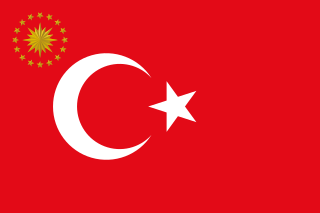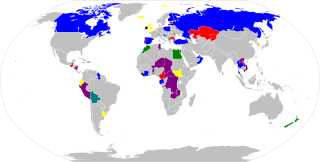
The president of Turkey, officially the president of the Republic of Türkiye, is the head of state and head of government of Turkey. The president directs the executive branch of the national government and is the commander-in-chief of the Turkish military. The president also heads the National Security Council.
A constitutional amendment is a modification of the constitution of a polity, organization or other type of entity. Amendments are often interwoven into the relevant sections of an existing constitution, directly altering the text. Conversely, they can be appended to the constitution as supplemental additions, thus changing the frame of government without altering the existing text of the document.

Elections in Niger take place within the framework of a semi-presidential system. The President and National Assembly are elected by the public, with elections organised by the Independent National Electoral Commission (CENI).

General elections were held in Liberia on 15 October 1985. They were the first elections since the 12 April 1980 military coup that brought Samuel Doe to power. During 1984, a new draft constitutional was approved in a referendum, which provided for a 58-member civilian and military Interim National Assembly, headed by Samuel Doe as president. After a ban on political parties was lifted, four parties – Doe's National Democratic Party (NDP), the Liberian Action Party, the Unity Party and the Liberia Unification Party – contested the elections.

The Constitution of Liberia is the supreme law of the Republic of Liberia. The current constitution, which came into force on 6 January 1986, replaced the Liberian Constitution of 1847, which had been in force since the independence of Liberia. Much like the 1847 Constitution, the Constitution creates a system of government heavily modeled on the Federal Government of the United States.

This national electoral calendar for 2011 lists the national/federal elections held in 2011 in all sovereign states and their dependent territories. By-elections are excluded, though national referendums are included.

A referendum to amend the Constitution of Liberia was held on 23 August 2011. Voters chose whether to ratify four amendments regarding judge tenure, elections scheduling, presidential candidate requirements and the electoral system. The National Elections Commission of Liberia (NEC) oversaw the referendum.

General elections were held in Liberia in May 1871.

General elections were held in Liberia on 4 May 1943 alongside a constitutional referendum. William Tubman of the True Whig Party was elected president, defeating James F. Cooper of the Democratic Party, a former secretary of the interior. He took office on 3 January 1944.

General elections were held in Liberia on 1 May 1951, the first to be held under universal suffrage; previously only male descendants of Americo-Liberians had been allowed to vote. This was the first elections in Liberia where women and the local Liberians owning property were allowed to vote based on a Constitutional Referendum in 1945–46. In the presidential election, William Tubman of the True Whig Party was the only candidate, and was re-elected unopposed.

A constitutional referendum was held in Liberia on 7 May 1935, alongside legislative elections. The changes to the constitution ensured that President Edwin Barclay remained in office without the need for the presidential elections due that year. Although it was claimed to be for economic reasons, the government feared that an election may lead to instability that would lower confidence of foreign powers and creditors. The next elections took place in 1939.

A constitutional referendum was held in Liberia on 3 May 1949. The changes to the 1847 constitution were approved in the Legislature in 1948, and abolished the two-term limit on presidents. The change was approved by voters.

A constitutional referendum was held in Liberia on 3 May 1955. The changes to the constitution would grant women in the Provinces the right to vote, grant all women the right to be elected to Parliament, and remove the section detailing that the Chief Justice would oversee any impeachment of the President or Vice-President. The changes were approved by voters.

A constitutional referendum was held in Liberia on 4 April 1972. The changes to the constitution would lower the voting age from 21 to 18, and had been announced by President William Tolbert shortly after taking office. On 15 February the date of the referendum was set to coincide with a by-election for the Vice Presidency. The change required a two-thirds majority in favour, and was approved by voters.

A constitutional referendum was held in Liberia on 1 May 1849, alongside general elections. The constitutional changes would increase the number of members of the House of Representatives for Sinoe County from one to three. The proposals were approved by voters.

A constitutional referendum was held in Bolivia on 11 January 1931. Voters were asked whether they approved of nine separate proposed amendments to the constitution, all of which were approved.
The following lists events that happened during 1943 in Liberia.

A constitutional referendum was held in Liberia on 8 December 2020 alongside Senate elections and two by-elections to the House of Representatives. It had been planned for 13 October, but was postponed due to the COVID-19 pandemic. Voters were asked whether they approved of eight amendments to the constitution, voting separately on each one. Although a majority of valid votes were in favour of each proposal, the two-thirds quorum was not met for any proposal.
Events in the year 2011 in Liberia.

This national electoral calendar for 2023 lists the national/federal elections held in 2023 in all sovereign states and their dependent territories. By-elections are excluded, though national referendums are included.







